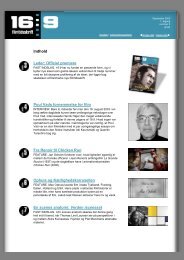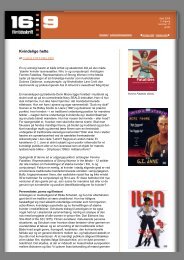Create successful ePaper yourself
Turn your PDF publications into a flip-book with our unique Google optimized e-Paper software.
tragedy (e.g. the assassination of Lincoln) and a political<br />
success (e.g. the emancipation of the slaves), or vice versa;<br />
A use of authenticity-enhancing features such as captions<br />
(as a temporal and spatial marker) and archival footage.<br />
The Political Biopic and the Star System<br />
It is a well-known fact that American films are streamlined and<br />
systematized, and that Hollywood is known for its industrial,<br />
conventional way of creating films. “A successful product is bound up<br />
in convention,” writes Thomas Schatz, “because its success inspires<br />
repetition.” (Schatz 1980, p. 5). Accordingly, American films abide by<br />
different systems, i.e. the genre system (based on readily recognizable<br />
genres), the studio system (where the production, distribution and<br />
exhibition of films are centralized and controlled by a few major<br />
companies), the continuity system (where films are edited in a<br />
seamless way, allowing for identification and immersion) and the star<br />
system (where films are sold through reference to major stars like<br />
Marlon Brando and Meryl Streep, for whom the films become vehicles,<br />
re-affirming their stardom) (ibid.).<br />
In this particular context the biopic is particularly interesting, since<br />
films of this genre are not only readily recognizable, but also natural<br />
vehicles for great actors and actresses. A biopic, in other words, is<br />
“Oscar material”, inasmuch as the film relies heavily on an actor’s<br />
ability to imitate or mimic a famous person.<br />
Most of us, it seems, have a natural interest in imitation, and<br />
impersonations have long been a popular attraction – from various<br />
Elvis impersonators to stand-up comedians (e.g. Jim Carrey)<br />
humorously mocking celebrities (such as Clint Eastwood) and actors<br />
playing well-known people, thus propelling their careers to new heights<br />
of stardom.<br />
Joaquin Phoenix, semi-famous for his role in The Gladiator (1999),<br />
became a household name after starring as Johnny Cash in Walk the<br />
Line, and people like Jamie Foxx and Josh Brolin went from B-list<br />
actors to Hollywood stars after appearing in Ray (2004, dir. Taylor<br />
Hackford) and W (2008, dir. Oliver Stone) (fig. 11-12).<br />
As Hal Foster (1996) says, we may currently be witnessing a “return of<br />
the real”, as markets are being flooded with political (auto)biographies<br />
(e.g. George W. Bush’s Decision Points [2011]), autobiographical fiction<br />
and mockumentaries (e.g. The Death of a President [2006], depicting<br />
the imagined assassination of George W. Bush), and documentaries<br />
and biopics about famous political figures (e.g. W). This alleged “return<br />
of the real,” however, only partly explains the American fascination<br />
with biopics, and another explanation, I argue, could be located in the<br />
personalized approach to history which is prevalent in the US.<br />
History as a Personalized Narrative<br />
The names D.G. Monrad and Orla Lehmann would hardly ring a bell to<br />
any Dane, let alone non-Danish people. However, these men have in<br />
fact been central to Danish history, signing the most central of all<br />
historical documents in Denmark – Danmarks Riges Grundlov (1849)–<br />
a document similar in national importance to America’s The Declaration<br />
of Independence (1776) (cf. Den store danske).<br />
In the US, on the other hand, most people would know of the men<br />
who signed the aforementioned declaration – indeed, they are even<br />
recognized as “the founding fathers” – and this accounts for a central<br />
difference between the historical memory and conception in the two<br />
countries (cf. http://www.youtube.com/watch?v=jYyttEu_NLU).<br />
The biopic is not an unknown genre in Denmark, and biographical films<br />
and drama series have been made on iconic authors like Hans<br />
Christian Anderson (cf. Den unge Andersen, 2005), singers like Liva<br />
Weel (cf. Kald mig Liva, 1992), variety and film actors like Dirch<br />
Passer (cf. Dirch/A Funny Man, 2011), great inventors like Jacob<br />
Ellehammer (cf. Nu stiger den, 1966) and founders of successful<br />
national companies like Carlsberg (cf. Bryggeren, 1996-1997). Political<br />
biopics, however, are a rarity in Denmark – to put it mildly – and this<br />
reflects an entirely different approach to politics and political history in<br />
Denmark, compared to the US (fig. 13).<br />
An All-American Hero: Lincoln as a fictionalized character<br />
A natural figure on whom to base a political biopic is Abraham Lincoln,<br />
a former American president who is known for delivering such hugely<br />
popular speeches as “The Gettysburg Address” and “The Emancipation<br />
Proclamation” (1863), and who is – perhaps narrow-mindedly –<br />
remembered for having freed the slaves.<br />
Hence, Lincoln, who sought a consensus and wished to free the slaves<br />
Fig. 11-12: Will Smith and Jamie Foxx both<br />
had their own sitcoms in the 1990s, but<br />
were not considered “serious” A-list actors<br />
until starring as Cassius Clay/Muhammad<br />
Ali and Ray Charles, respectively, in Oscar<br />
nominated biopics).<br />
Fig. 13: In Borgen (DR, 2010-) Sidse<br />
Babett Knudsen plays the first female Prime<br />
Minister of Denmark, a character that is<br />
often seen as a reflection of Helle<br />
Thorning-Schmidt (as of today, the actual<br />
Prime Minister of Denmark). The popular<br />
drama series, however, can hardly be<br />
described as a biographical show, in that<br />
Knudsen’s character is called Birgitte and<br />
in no way physically resembles Thorning-<br />
Schimdt (the main character in Borgen has<br />
also, on many occasions, been compared<br />
to Margrethe Vestager, a Danish politician<br />
representing Det Radikale Venstre. ).<br />
Political biopics are few and far between in<br />
Denmark, but in America the political biopic<br />
is a popular type of film, firmly rooted in<br />
Hollywood’s canon of genres.
















